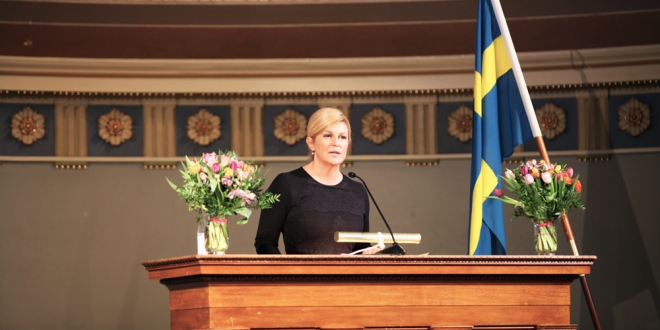Croatia’s President Kolinda Grabar-Kitarovic visited Lund on Friday to address the importance of NATO and the EU to the future of Southeast Europe.
By Oskar Madunic Olsson. Translated by Cecilia Eriksson
Croatia’s head of State Kolinda Grabar-Kitarovic is a former Foreign Minister and top diplomat. She visited Lund on Friday to give a speech in the Lund University Main Building about the role that EU and NATO plays in Southeast Europe. Croatia declared its independence from Yugoslavia in 1991 but did not gain full control of its territory until 1995, after several years of war against Serbian separatists. Since then, this young state has been struggling with problems of corruption, a weak economy, high unemployment rates and brain drain – which means the emigration of highly educated people. In 2013, Croatia joined the EU, something many were hoping would improve the economy. The country is also a member of NATO. Kolinda Grabar-Kitarovic says Croatia’s neighbouring countries also need to become members of these organisations to secure a lasting peace and initiate a reform in the region.
“Unfortunately, the EU and NATO has currently been turning away from Southeast Europe. This will probably lead to a negative development in the region that could turn ethnic oppositions into a perilous situation”, says Kolinda Grabar-Kitarovic, the President of Croatia.
As an example of how the surrounding world has lost interest in the former Yugoslavia, the president referred to the coup d’état that occurred in Montenegro last year. A number of Russian agents, later ordered to leave Serbia, are suspected of being behind the attempted coup d’état. However, these events never gained much attention in Western Europe and many do not even know anything happened at all.
Must Stop Extremism
According to Kolinda Grabar-Kitarovic, another threat against the stability in Southeast Europe is the growing influence of Saudi Arabia and Qatar over parts of the population by, for example, building mosques and making other investments.
“Of course, the rich states of the Middle East are allowed to give Muslims financial support, but they have no right to interfere with our politics. In Croatia, we do not accept this and neither should anyone else. Our Muslim minority has always been extremely well integrated, but now Islamism is beginning to thrive in the region,” says Kolinda Grabar-Kitarovic. She says the need for reform is great in Southeast Europe, perhaps especially in Bosnia and Herzegovina who has a weak economy and weak political institutions. If modernisation and development do not get started then, according to Kolinda Grabar-Kitarovic, ethnic conflicts might again start to escalate.
“Bosnia needs social, financial and political reforms. To begin negotiations of EU and NATO memberships and trying to meet the criteria would quicken the development. For long-term security in the region, it would be an absolute necessity,” says Kolinda Grabar-Kitarovic, the President of Croatia.






